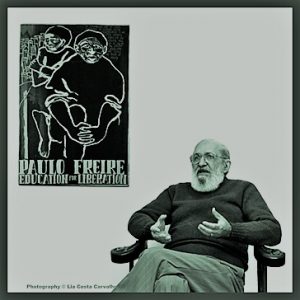In the preface of the Pedagogy of the Oppressed, Freire makes clear that the pedagogy of the oppressed to be presented ” is a task for radicals, it cannot be carried out by sectarians”. This warning was a type of catalyst to me, for the title of the book was instead evoking, at first sight, powerful images of liberation, fight, freedom against all forms of nepotism, neo-colonialism, and social disparity in their primary senses that I was looking for in the trouble linguistics, social and economic context of my country of origin: Cameroon.

Fortunately(or may be unfortunately), Freire makes a clear distinction between sectarianism and radicalism. The first is made up of Christians(?), Marxists, and tends to mysticize while his approach is radicalism who criticizes and liberates. What is the modus operandum of Freire radicalism? What does it stand for? What does Freire radicalism criticize? How does it liberate? who does it liberate? From what does it liberate? for what purpose?
Freire’s primary aim is the humanization of illiterate and social groups who evolved at the fringe of the Brazilian society due to poverty, lack of educational knowledge, namely the incapacity of decoding the power behind scriptural encoding of the world in words. He wants to educate the oppressed masses by arising in them, not only to the consciousness of their humanity which had been imprisoned by the dominating class – the oppressors- through the limitation of their access to qualitative knowledge. By education, those ”outcasts” are to regain their humanity, while at the same time being educated to educate and liberate their former oppressors who are just also the victim of the system that placed them in the domineering position:
In order for this struggle to have meaning, the oppressed must not in seeking to regain their humanity( which is a way to create it) become in turn oppressors of the oppressed, but rather restorators of the humanity in both.
In other words, Freire is convinced that the liberation process is only possible through “critical and liberating dialogue ” that will enlighten both the oppressed and the former oppressors, victims of the system. The question arising here would be for who or what does the “system” stands for?
If one thing is sure, it is that Freire doesn’t point a finger at the oppressors(individuals) but at the system, the educational process accused of the malfunctioning of society. For that reason, a revolutionary leadership must ”practice co-intentional education. Teachers and students(leadership and people), co-intent of reality, are both Subjects, not only in the task of unveiling ”a given reality or coming to apprehend through critical reasoning, “but in the task of recreating that knowledge”.
In addition, the struggle of the oppressed is to realize what they are fighting for, “not merely for freedom from hunger, but for freedom to create and to reconstruct, to wonder and to venture”. In fact, the reconstruction passes through a deconstruction of the old and archaic system that has been alienating and imprisoning the student in a position of inferiority, that made him the depository, a recipient of the teacher or the system world’s view. This, called the “banking” system is the one to revolutionize.
The nodal component in the banking system is that ”the teacher knows everything and the students know nothing”. Others components gravitating around it are: “the teacher thinks and the students are thought about, the teacher talk and the students listen-meekly, the teacher disciplines and the students are disciplined, the teacher chooses the program content, and the students(who were not consulted) adapt to it”, etc.
The above elements of the banking system can be resumed as the subject/object relation, where the teacher is the subject and the student the object. In fact, for Freire, the banking system constitutes the reasons why the system is so alienating and denaturing. The banking concept should be replaced by problem-posing education which is “revolutionary futurity”‘. Therefore, the problem-posing education model should be “attempting to be more human” by positioning the teacher and the student at the same position: Subjects. These subjects or co-subjects are similar to co- intentional education and are built around a key concept: dialogue.
By Dialogue, Freire means the encounter of “those addressed to the common task of learning and acting” for he emphasizes the communal character of the educational/liberating process. He then proposes theories of revolutionary action as opposed to the theory of oppressive action, both organized around the varying and variable positions of the subjects/actors, actors/subjects.
After reading this summary of Freire’s view in Pedagogy of the Oppressed, what are your opinion about the educational models upraised by Freire in the late ’60s? What is the position of the banking system model in education today? Is the banking system really an antique dehumanizing learning system? What are the limits of the problem-posing method? Is it applicable to all fields of study/learning or is it restricted to some disciplines?



